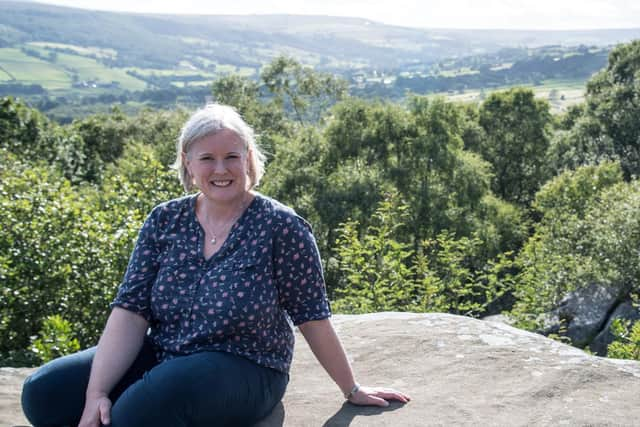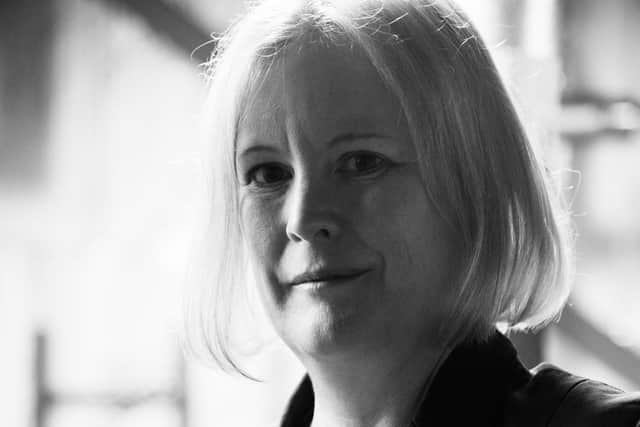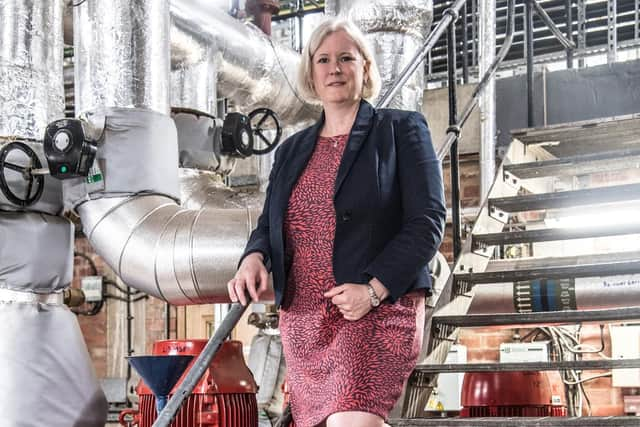Meet the Leeds professor at the forefront of advising the government on coronavirus
and live on Freeview channel 276
Enter Professor Cath Noakes, an academic from the University of Leeds, whose arguably specialised area of research into the role of buildings in spreading disease has become a crucial part of the government’s Scientific Advisory Group for Emergencies (Sage).
“Until this happened, it was a niche area,” Prof Noakes told the Yorkshire Post in one of her first interviews since the pandemic hit.
Advertisement
Hide AdAdvertisement
Hide AdWith a background in mathematical engineering, and a PhD on fluid dynamics - focusing on the modelling of photographic films - Prof Noakes describes getting into her current field as an “accident”.


But following a role at the University of Leeds looking at the role of air disinfection for tuberculosis, she said she discovered the “human face of engineering” where technical drawings and modelling could only help if it was combined with the context in which she was working.
“There is a very small number of people who work certainly in my specific area of looking at this whole relationship between the built environment and disease transmission,” said Prof Noakes, who is one of the only voices on Sage outside of the Golden Triangle of Cambridge, Oxford, and London.
“And for years, it's been a niche area, and quite, at times, hard to get funding to support, because a lot of people say ‘does it matter?’”
Advertisement
Hide AdAdvertisement
Hide AdBut as life starts to return to a new normal after the pandemic, with the Prime Minister urging people to return to office and help support desolate high streets, Prof Noakes said: “I think this is making us realise it does matter even more.”


She said: “There's loads and loads of anecdotal stories of people saying ‘oh, yeah, well, everybody in the office got it’ and there's probably a lot more that we need to know about how disease spreads in buildings. And what we're finding out through the research around Covid is probably going to have big implications for all kinds of other diseases.”
The importance of Prof Noakes’ work has been recognised today with an award from the Royal Academy of Engineering, for her contribution to the pandemic response.
But her job is not over yet, with fears mourning over how winter may usher in a second spike of the disease which has so far killed more than 41,000 people in the UK alone, and more than 770,000 worldwide.
Advertisement
Hide AdAdvertisement
Hide AdProf Noakes work is centred on all the kinds of measures the public is now coming to accept in their day to day life in order to control the virus, from social distancing, to face coverings, hand and surface hygiene, and ventilation.


“We look at what do we understand about how the disease is transmitted? And that’s difficult, because it changes all the time,” she said.
But while it is easier to get people to wash their hands, she said “when you’re talking about air, that’s much harder for people to do something about themselves”.
She said: “It’s a scary concept and there’s this growing evidence that the air does matter.”
Advertisement
Hide AdAdvertisement
Hide AdProf Noakes was one of more than 230 scientists who signed a letter to the World Health Organisation (WHO) calling for greater acknowledgement of the airborne spread of coronavirus.
The WHO then acknowledged there was “emerging evidence” coronavirus could be spread through particles in the air.
Prof Noakes said: “[We have been] arguing for months that there’s an aerosol component to this, that we shouldn’t ignore the aerosol component.
“And that doesn’t mean the disease has changed and it doesn’t turn into a big scary thing where suddenly everything you breathe is risky. What it means is we need to be really careful about indoor spaces and poorly ventilated spaces.
Advertisement
Hide AdAdvertisement
Hide Ad“And that raises a lot of bigger engineering questions. For a number of years now we’ve focussed on energy efficiency for how we design buildings and actually that has potentially led to some negative consequences where we’ve tightened up buildings and reduced our ventilation rates to save energy.”
It means that as the weather turns colder, and windows and doors are shut up to protect against the cold, poorer ventilation could cause issues.
“Winter bothers me,” Prof Noakes said.
“There's a number of factors in there, there's obviously people going back to school, people going back to universities, we’re increasing the amount of interactions in society, and that's all predicted to start happening in September.
“But then too is the fact that in the winter everybody goes indoors, you don't see people for months, people shut the windows, people shut their doors, people's health is generally poor anyway, you're more susceptible to other seasonal viruses.
Advertisement
Hide AdAdvertisement
Hide Ad“And it does feel like there's a risk that these things will come together, and it worries me too about the mental health impacts of it in the winter as well, at least when we went into lockdown, it was when it was warm and the days were getting longer and we could all go outside.”
But those fears are not to say things should not start to move, with Prof Noakes joining Sage colleagues in saying if there had to be a choice, pubs should be closed to balance the risk of opening up schools.
“I would be of the opinion that we should be prioritising children as best we can,” she said.
“I think it is more important that they get the opportunity for their education and their interactions and their social development than for adults to get the chance to go and have a beer.”
Advertisement
Hide AdAdvertisement
Hide AdShe added: “It may be that having full time school all the time is going to be hard, but I think you've got to have some time for face to face interactions with children.”
And she said it was also possible to make workplaces Covid secure, by looking at things like the layout of buildings and their ventilation.
“If you design it well, space people out, and put the right systems in place, you can achieve it,” she said.
But she was less convinced by an “obsession” with one way systems.
Advertisement
Hide AdAdvertisement
Hide Ad“Actually you have to think about when does the risk happen? So the risk is most likely when you are spending a significant amount of time with somebody, so if you’re passing somebody in a corridor, the risk is not zero but it’s probably very low, because you don’t have enough time to be exposed to that person’s exhale.”
She said moving into the winter months “people perhaps have to be prepared that they
may not be able to socialise as much as they would like during that period and they may have to sacrifice some things and to be thinking carefully about how they interact with people”.
She stressed the importance of using face coverings, and even potentially the use of air cleaners.
Advertisement
Hide AdAdvertisement
Hide AdAnd while she would not be drawn on how the government’s handling of the pandemic so far had gone, she did suggest there could be useful policy drawn up to support households in the cold to keep their homes heated to fight the disease.
“The virus will survive better when it’s colder and drier,” she said. “I’m not going to say overheat your house and try and make it really humid but trying not to let it get too cold and trying not to let it get too dry is possibly a very marginal effect, but it might well help and it helps you maintain your own health too.
“I appreciate for some people with affordability of heating - and particularly if we say increase your ventilation - [that would be] hard, and it would be good if there was some policy intervention in that space.”